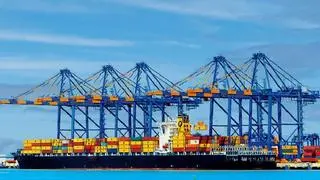On March 9, when crude oil (Brent) crashed from $50 a barrel to $35 a barrel, aggravating the pain in many Indian stocks, the two listed airline stocks held out – IndiGo Airlines gained 3 per cent that day and SpiceJet closed flat. This was based on the hope that reduction in fuel costs would offset, to some extent, the hit from the fall in air travel demand due to the spread of coronavirus. Fuel, after all, is the largest expense for Indian carriers, accounting for about 40 per cent of their costs. But the relief was short-lived.
Over the past two weeks, Brent has gone down further to about $25 a barrel. But the airline stocks have crashed ― IndiGo is down about 33 per cent, while SpiceJet has lost nearly 50 per cent since March 9. This sharp reversal is due to the worst case scenario playing out for airlines ― cancellation of all passenger flights, internationally and domestically, to combat the spread of coronavirus. There is no saying how long the flight shutdowns will continue ― they could go beyond the tentative deadline of March 31, if the situation does not improve. The massive demand destruction has washed away any gains that airlines could have made from the decline in fuel prices.
Aviation consultancy Centre for Asia Pacific Aviation (CAPA) has warned that with cash fast running out, many airlines across the globe could go bankrupt by the end of May without government support. The unprecedented crisis has forced the Centre to postpone the proposed disinvestment of Air India. All private airlines in India are also taking a huge hit.
Some airlines though seem to be worse off, going by the extent of the hammering their stocks have taken ― the SpiceJet stock has taken a sharper knock, and is down almost 70 per cent since December-end, while IndiGo has lost nearly 40 per cent. What explains this?
Financial comparison
The market seems to be taking a bleak view of SpiceJet’s weaker financial position, financial performance and cash flows compared to IndiGo.
Even before the coronavirus hit, the past couple of years have been quite bad for Indian carriers. Jet Airways collapsed just about a year back; SpiceJet posted a loss of ₹316 crore in FY2019, while IndiGo’s profit of ₹156 crore for that year was about 93 per cent lower year-on-year. Cut-throat price competition due to rapid capacity expansion and high cost pressure took a toll on the carriers.
The collapse of Jet Airways last April helped the other airlines but not uniformly. For the nine months ended December 2019, IndiGo posted profit of ₹625 crore, but SpiceJet ended up with loss of ₹128 crore. Had it not been for ‘other income’ of ₹537 crore that SpiceJet has taken into account as expected compensation from Boeing for the grounding of its 13 Max 737 aircraft, SpiceJet’s loss for the nine months ended December 2019 would have been higher; the company’s auditors have frowned upon this seemingly aggressive accounting.
SpiceJet’s financial position is also more vulnerable to shocks than market leader IndiGo’s. As of September 2019, IndiGo’s net worth was a positive ₹6,226 crore, while its financial assets were ₹20,421 crore (of which cash, cash equivalents and bank balance were ₹9,676 crore). On the other hand, SpiceJet’s net worth as of September 2019 was a negative ₹851 crore, while its financial assets were ₹1,308 crore (of which cash, cash equivalents and bank balances were ₹86 crore). IndiGo’s borrowings (other than trade payables, lease and other financial liabilities) as of September 2019 stood at ₹622 crore, while that of SpiceJet was ₹917 crore.
IndiGo’s cash flow from operating activities for the half-year ended September 2019 was ₹3,990 crore, while that of SpiceJet was ₹1,168 crore.
Other troubles
It doesn’t help that the ongoing turmoil in global aviation could likely delay the receipt of the much-awaited compensation that SpiceJet expects from Boeing, and also the resumption of operations of 737 Max aircraft, which is important for improving SpiceJet’s operating performance. Besides, the long-running dispute on securities’ allocation between SpiceJet and its erstwhile promoters, the Marans, is an overhang and could result in cash outflow for the airline.
All airlines are going to be hurt badly due to the coronavirus lockdown. But IndiGo’s stronger financial profile (notwithstanding the dispute between its promoters), positions it better than its competitors to weather the storm.








Comments
Comments have to be in English, and in full sentences. They cannot be abusive or personal. Please abide by our community guidelines for posting your comments.
We have migrated to a new commenting platform. If you are already a registered user of TheHindu Businessline and logged in, you may continue to engage with our articles. If you do not have an account please register and login to post comments. Users can access their older comments by logging into their accounts on Vuukle.